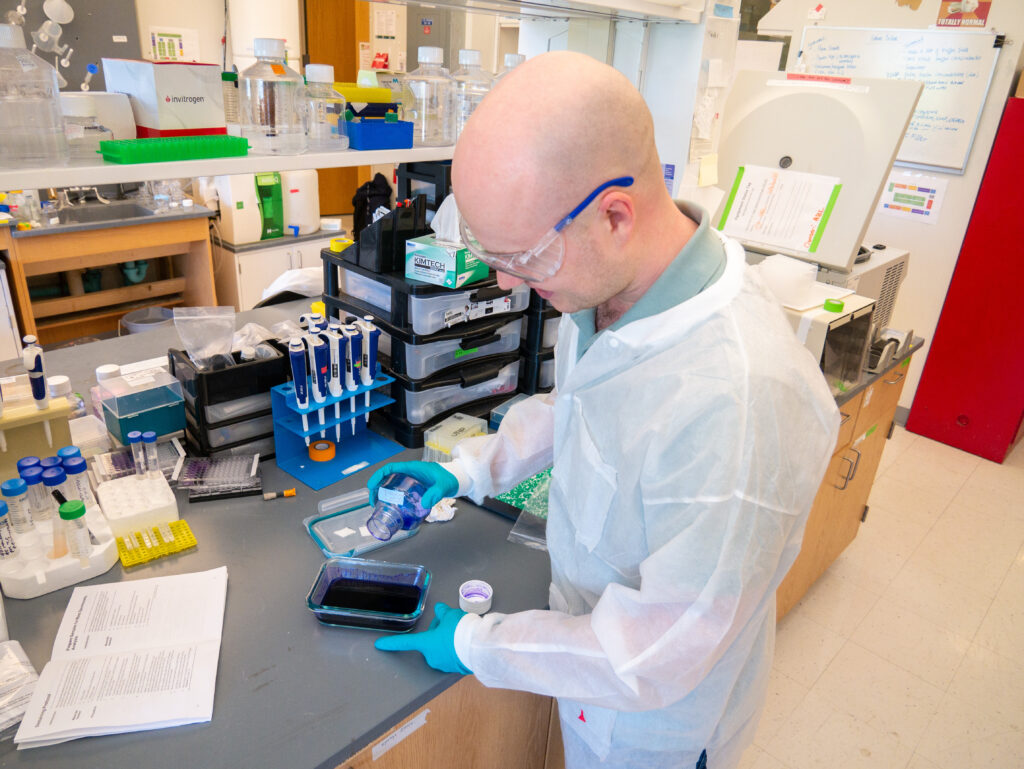
Stefano Menegatti, professor in the Department of Chemical and Biomolecular Engineering at NC State University, specializes in technological innovation in downstream bioprocessing and analytics. He is the principal investigator for two AIM-Bio research projects: Peptide-based adsorbents for affinity-based capture of next-generation therapeutics and Single-use technology for the flow through polishing of protein therapeutics.
A key contributor to the AIM-Bio research program, his research group introduced the paradigm of flow-through affinity chromatography, where process- and product-related impurities are captured as the cell culture harvests flow through the affinity adsorbent, while the product flows through unbound. His work on continuous biomanufacturing technologies — now focused on CRISPR Cas nucleases, viral vectors for in vivo and ex vivo gene therapy, and bispecific antibodies — has received numerous awards including the NSF CAREER award in 2017 and the ALCOA Foundation Research Achievement Award in 2021. Read on for a summary of his research in bespoke affinity ligands, continuous downstream processing, and viral vector purification.
Bespoke Affinity Ligands – The research team led by Dr. Menegatti within the Department of Chemical and Biomolecular Engineering has established a workflow to develop affinity ligands with tailored binding selectivity and elution behavior. This method relies on a microfluidic device comprising a microfluidic bead-imaging/sorting chamber placed in a fluorescence microscope and equipped with a camera for high-resolution imaging. Using this device, the team has developed a high-throughput assay to screen libraries of peptides conjugated on translucent beads against fluorescently-labeled proteins as described in the following steps: (i) the beads are fed individually at high speed to the sorting chamber, where they are imaged in different color channels to monitor the binding of both target and competitor species; (ii) the collected images are processed in real time to extract image metrics that correlate the fluorescence emission intensities to the strength and selectivity of target:ligand binding and guide the selection of high affinity ligands; and (iii) the selected beads are withheld in the imaging chamber, where they were exposed to a flow of an elution buffer designated by the operator and subsequently re-imaged to select leads that combine selective binding with efficient elution. Using this technology, the Menegatti team has discovered ligands targeting a variety of biotherapeutics, including blood factors, therapeutic enzymes, CRISPR-Cas nucleases, and viral vectors for gene therapy.
Continuous Downstream Processing – The push towards accelerating biomanufacturing and the growth of advanced analytics in the biopharmaceutical industry pose a need for new purification technologies dedicated to the continuous clearance of process-related impurities. Responding to these challenges, the Menegatti and Carbonell groups (led by Ruben Carbonell, Frank Hawkins Kenan Distinguished Professor of Chemical and Biomolecular Engineering at NC State) introduced LigaGuard™. LigaGuard™ is a chromatographic adsorbent functionalized with an ensemble of synthetic peptide ligands that target host cell proteins (HCPs) and DNA (hcDNA). When continuously loaded with a harvested cell culture fluid (HCCF), LigaGuard™ captures HCPs and hcDNA while allowing the product to flow through unbound. Notably, the ligands efficiently capture species that have been documented to persist through the purification pipeline and pose a threat to patient’s safety and product quality, while ensuring a good yield of the mAb product. In the context of the growing efforts towards continuous manufacturing, LigaGuard™ has the potential to seamlessly integrate with new process designs such as periodic countercurrent chromatography (PCC) or simulated moving bed chromatography (SMB). Furthermore, by removing a significant fraction of the HCPs in the feedstock, LigaGuard™ can improve the performance and lifetime of the subsequent chromatographic adsorbents, thus promoting process robustness and product quality. While initially dedicated to purification from Chinese Hamster Ovary (CHO) fluids, the LigaGuard™ technology has been expanded to include fluids produced by mammalian (HEK293 and Vero), fungal (P. pastoris), and bacterial (E. coli) cells.

Viral Vector Purification – The purification of viral vectors is currently performed using adsorbents that are expensive and afford limited product yield and bioactivity, and it relies on process designs that are slow and suffer from large capital/operational costs. The Menegatti group is transforming virus purification technologies by introducing processes that achieve continuous removal of impurities and gentle isolation of gene-loaded vectors, thus boosting product efficacy and safety while reducing process footprint, cost, and time. Its technology portfolio includes (i) adsorbents that selectively isolate the transgene-loaded viral vectors under gentle recovery conditions to preserve their transduction activity, and (ii) purification processes that operate continuously and autonomously, reduce the use of aqueous streams up to 10-fold, and increase productivity up to 5-fold compared to current processes.
For additional information about his work in these research areas, email Dr. Menegatti at smenega@ncsu.edu